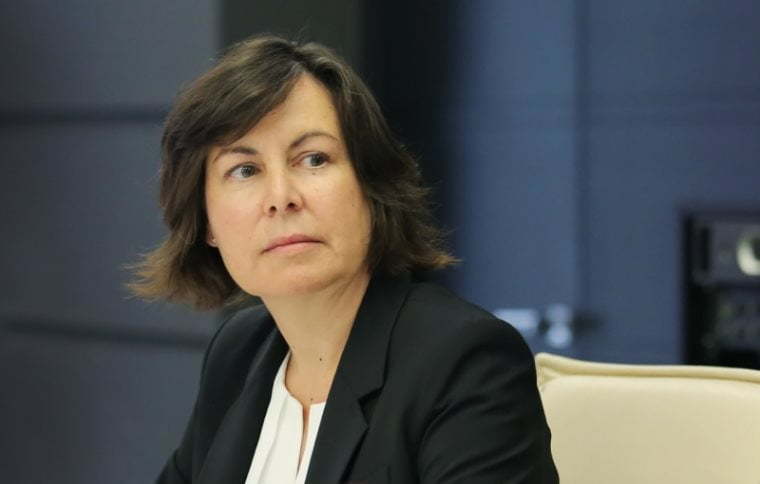“The IMF welcomes the recent increase in reserve requirements for foreign currency deposits, and reduction for Lari deposits, which will help promote de-dolLarization”, – Interview with IMF Mission Chief Ms. Mercedes Vera Martin.
What is the Fund’s assessment of the actions by the National Bank of Georgia (NBG) during the external shock of 2015?
Since mid-2014, Georgia has been hit by external shocks that are likely to persist. The decline of commodity prices and raw materials reduced growth in Russia, the Caucasus and Central Asia (CCA), important markets for Georgian exports and tourism. Also, the currencies of Georgia’s main trading partners depreciated against the Lari which made Georgian exports relatively more expensive. Finally, the U.S. dollar strengthened, increasing the Lari value of loans that households and companies had taken in dollar. However, the decline of commodity prices served the Georgian economy well, as it lowered the cost of importing gas and raw material.
The response of the NBG to this shock was appropriate. The NBG allowed the exchange rate to absorb the external shock without further hurting exports and the economy while safeguarding foreign exchange reserves. In line with the inflation targeting regime, the NBG increased its policy rate to keep inflation close to its 5-percent target in 2015. So far banks have held up well despite the depreciation; which is in part a testimony to the diligence and quality of the NBG’s financial regulation and supervision in preventing banks from taking on excessive risk. The Fund also welcomes the collaboration of the NBG and the government on a comprehensive de-dolLarization strategy as this will improve the resilience of the economy and limit the risks associated with foreign-currency lending.
Why has the exchange rate varied so much? How do you see the developments with the Lari exchange in the near future?
The changes in the exchange rate over the past two years reflect changing economic conditions and are consistent with a floating exchange rate regime. Exchange rate movements have been largely market-determined, and resulted in some excessive volatility at times due to uncertainty about global and regional developments and its impact on the Georgian economy.
In particular, a general strengthening of the U.S. dollar and lower oil prices in 2015 resulted in a large depreciation of the Lari against the U.S. dollar. Equally relevant for Georgia is the exchange rate against its trading partners. Trading partners’ currencies also depreciated against the dollar and, as a result, Georgia’s exchange rate against its trading partner depreciated to a lesser extent. The depreciation limited the decline of exports and remittances measured in Lari.
More recently, the Lari has appreciated reflecting a strong tourist season and some increase in oil prices which improves Georgia’s trading partners’ outlook.
The IMF does not predict short-term exchange rate movements. The value of a currency depends on both external and internal conditions which affect supply and demand of the currency. The NBG has an inflation targeting mechanism in place. Hence, it cannot control the short-term value of the Lari. We support this approach by NBG, and our recommendation for the NBG is not to intervene on the exchange rate market, consistent with its inflation targeting framework, unless there is excessive volatility or a need to rebuild reserves.
The IMF has supported Georgia’s decision to have a floating exchange rate while some Georgian experts (or commentators) have criticized the NBG for not defending the Lari last year. What are the benefits of floating exchange rate for Georgia?
As a small open economy subject to frequent and persistent external shocks, the floating of exchange rate has served Georgia well. A flexible exchange rate regime allowed for the use of the exchange rate as a shock absorber, limiting the adjustment of domestic prices and wages. In particular, as mentioned in my earlier answer, the Lari depreciation has safeguarded export competitiveness; maintained the value of remittances in Lari; and preserved external buffers. Over time, exchange rate flexibility also helps prevent large external imbalances. Greater exchange rate flexibility can also promote financial market development, de-dolLarization, economic diversification and sustainable growth, a key priority for all CCA countries.
How do you assess recent monetary policy easing by the NBG?
Recent NBG’s steps to lower the policy rate (more recently to 6.75 percent) are welcome and consistent with an environment of low inflationary pressures and weaker-than-expected domestic and regional demand. With July inflation at 1.5 percent, inflation has dropped substantially below the 2016 inflation target of 5 percent. In such context, there could be scope for additional rate cuts in the short term, which, in turn, would help support credit and economic growth.
What do you think about reactivation of the de-dolLarization policy that Government and the NBG are working on?
The Fund welcomes the authorities’ steps to reduce dolLarization in the economy. DolLarization, which refers to the extensive use of foreign currency in the financial system and the economy in general, makes the economy more vulnerable to exchange rate movements. It also increases financial stability risks; both households and firms see their foreign-debt burden increase when the Lari depreciates, and banks may face losses if their borrowers fail to service their loans. It also undermines the NBG’s ability to conduct an effective monetary policy towards low and stable inflation and to provide emergency liquidity support in case the banking sector runs into difficulty.
Cross-country experience shows that macroeconomic stability, including a low and stable inflation rate, and exchange rate flexibility help to successfully de-dolLarize an economy. Georgia’s economic performance is therefore promising, and a successful inflation targeting framework should help reduce the attractiveness of dollar savings and dollar lending. Exchange rate flexibility makes less attractive to lend and/or borrow in foreign currency. The IMF welcomes the recent increase in reserve requirements for foreign currency deposits, and reduction for Lari deposits, which will help promote de-dolLarization.
In addition to sound macroeconomic policies, the authorities’ de-dolLarization strategy creates further incentives to use Lari in the financial system. The strategy rightly focuses on making it more attractive to hold bank deposits in Lari; ensuring that banks fully recognize the risks associated with dollar loans; limiting dollar loans to households and firms without steady revenue streams in dollar; reducing cost and risk banks face when extending Lari loans; and encouraging the real estate sector to start pricing in Lari.
What is the Fund’s outlook for medium-term growth for Georgia?
As I mentioned in my answer to your first question, the current economic slowdown is primarily the result of an external shock, and this shock is likely to persist. In the medium term, when economic conditions in surrounding countries normalize, Georgia should return to earlier years’ growth levels. A key condition for uninterrupted growth is strong macroeconomic fundamentals, and the Fund maintains an ongoing dialogue with the Georgian authorities on supporting macroeconomic stability and sound macro policies.
For Georgia to develop its potential, structural reforms are very important. Promoting an environment where it is easy to establish companies and do business, developing new export-oriented businesses, and securing a well-educated and qualified work force are key elements to promote higher and more inclusive economy growth. The government’s planned capital market and financial reforms and pension reforms will also help mobilize domestic savings to finance investment and growth.
However, there are also risks to the outlook. The external environment continues to be uncertain. Although low oil prices benefit Georgia through cheaper oil imports, they have a negative impact on Russia and the slowdown in the Chinese economy has negative effects on Georgia and the region.
NTERVIEW IN GEORGIAN.
"Forbes Georgia-ის სარედაქციო ბლოგპოსტების სერია "როგორ გამდიდრდა“ და "საქართველო რეიტინგებში".

















